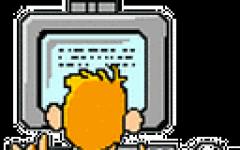Not everyone requires you to list your weaknesses on your resume. But if there is such a clause on the form, then putting a dash through would be a mistake. Better look at an example of character weaknesses in your resume.
What to write
Before filling out the box in which you need to indicate your shortcomings, think about your answer. Do not miss it under any circumstances, because ideal people do not exist. As a rule, managers want to see how adequately you evaluate yourself. If you don't know what to write, look at the suggested options and choose something that suits you best.
A universal formula: select character traits that are an advantage for performing this particular job, but in ordinary life can really be considered a human flaw.
The following weaknesses can be written:
- excessive directness, the habit of telling the truth face to face;
- difficulty establishing contact with strangers;
- inability to show flexibility in labor matters;
- reliability;
- increased anxiety;
- excessive emotionality, hot temper;
- love of formalism;
- restlessness;
- slowness;
- hyperactivity;
- fear of air travel.
All of the weaknesses listed in your resume can become strengths if you look at them from a different angle. An example is restlessness. For a sales representative or active sales manager, this can even be a plus. The same goes for reliability. This is a signal to the manager that you may be the person who will do all the overtime work.
Linking weaknesses to the characteristics of professions
All applicants should think about how to write my weaknesses for a resume. For example, a future accountant or design engineer might write:
- distrust;
- excessive scrupulousness;
- increased anxiety;
- excessive demands on oneself;
- straightforwardness;
- pedantry;
- modesty;
- inability to lie;
- difficulties in establishing contact with strangers;
- self-esteem;
- lack of flexibility in labor matters;
- integrity;
- inflated sense of responsibility;
- lack of diplomacy.
- hyperactivity;
- self-confidence;
- restlessness;
- impulsiveness;
- the need for external motivation;
- distrust, desire to double-check and confirm all information.
Disadvantages for one profession can become advantages for another.
You can also indicate in your resume among your negative qualities:
- straightforwardness;
- workaholism;
- excessive love of communication.
Applicants for the position of manager must prepare before filling out this column. It’s better to think in advance about what weaknesses to include in your resume. You can write to them about the following character traits:
- excessive emotionality;
- pedantry;
- love for little things;
- thoughts about work and planning occupy most of your free time;
- increased demands on others.
A good example would be the following:
- inability to respond to rudeness with rudeness;
- tendency to make decisions based on one’s own opinion;
- distrust of people and love of confirmation of facts.
Some applicants prefer to indicate that they:
- overly trusting;
- can raise their voice to subordinates;
- straightforward, express their opinions without veiled embellishments;
- hot-tempered;
- always looking for confirmation of words;
- have a hypertrophied sense of responsibility;
- prone to formalism and pay excessive attention to detail;
- irritated by clutter;
- slow;
- do not like to do something to please others.
For all occasions
Many people are afraid to write about shortcomings, believing that the employer will immediately send their resume to the trash bin. Of course, you shouldn’t be too frank, but you shouldn’t completely skip this section of the questionnaire. In this case, you can write about some neutral qualities that will not affect your work in any way. For a person applying for any vacancy, among the inherent weaknesses one can indicate:
- fear of airplanes;
- arachnophobia (fear of spiders), vespertiliophobia (fear of bats), ophidiophobia (fear of snakes);
- excess weight;
- lack of experience;
- age (suitable for people over 40 years old);
- love of shopping;
- love for sweets.
This information does not characterize you in any way, it simply speaks about your fears or small weaknesses.
The following disadvantages can be mentioned:
- I don’t always express my thoughts accurately;
- I trust people too much;
- prone to reflection;
- I often analyze past mistakes, focusing too much attention on them;
- I spend a lot of time evaluating my actions.
These are negative qualities, but they should not affect the work process.
Regardless of the position for which you are applying, you can write the following weaknesses in your resume:
- I get so carried away with work that I forget to take breaks;
- I can’t build relationships with colleagues because I don’t like gossip;
- I can’t fight back in response to boorish treatment;
- I constantly pass all situations through myself;
- I let people get too close;
- I don’t know how to swear;
- I get noticeably worried when I have to lie.
Important nuances
Please note that there are items that are best left unindicated. You should not write, for example, that you:
- love to be lazy;
- afraid to take responsibility;
- don't like making decisions;
- unpunctual;
- are often distracted;
- you only think about your salary;
- love office romances.
For example, if you write about your laziness in your resume, you run the risk that the employer will decide that you don’t want to work.
It can be quite difficult to separate what should be classified as personal and what should be classified as business qualities in a resume. If you are talking about character traits that relate to work, then they can safely be classified as the latter. Examples of business qualities for a resume will help you figure out what and how best to enter into this column.
Popular options
Most often, the following business traits appear in the requirements of employers and resumes of applicants:
- ability to work independently;
- determination;
- assertiveness, result-oriented;
- communication skills;
- determination;
- organizational skills;
- fast response,
- increased performance;
- ability to make decisions;
- love of planning;
- oratory skills;
- the ability to formulate your thoughts;
- diligence, ability to complete tasks, ability to follow instructions;
- tact, politeness, tolerance.
It is not necessary to list all the business qualities of a person that you know. You only need to include in the resume you provide what suits you best.
Connection with professions
You need to choose business qualities depending on the requirements for the vacancy for which you are applying.
For example, when sending a resume for an open managerial position, you need to carefully select your words. You can indicate the following business qualities:
- desire to work, develop and learn, responsibility, communication skills, stress resistance;
- flexibility, ability to adapt, organizational skills, public speaking skills;
- tolerance, loyalty, ethics, honesty, ability to work in any conditions and in different teams;
- logical thinking, the ability to highlight important things, professional flair, the ability to analyze and see the future.
For technical specialists, analysts, economists, accountants, and office clerks, it is better to focus on other qualities in their resumes:
- pedantry, attention to detail, dedication, accuracy;
- perseverance, ability to retain necessary information in memory, analytical mind;
- foresight, ability to collect and analyze data, accuracy, focus on results;
- scrupulousness, punctuality, ability to plan and organize the work process, analytical skills.
If the position involves active communication with people, then the following qualities will be priority:
- communication skills, the ability to see the client’s problem, cooperate, find an individual approach;
- collectivism, love of teamwork, sociability, efficiency, ability to negotiate;
- easy adaptation, ability to work under stressful conditions, competent speech, energy, organization;
- politeness, tolerance, knowledge of business ethics, decency, honesty, dedication.
But this example is not a ready-made template. It’s better to make a selection from several options so that the given characteristic reflects your qualities in the best possible way.
162 455 0Hello! In this article we want to tell you about the strengths and weaknesses of a person. After all, everyone has to face this question when writing a resume or during an interview for a job.
Strengths and weaknesses of a person
The strengths and weaknesses of a person are closely related and should not contradict each other. Each person has their own disadvantages and advantages. As a rule, we are used to talking about strengths, but we are often silent about weaknesses.
An independent, goal-oriented and self-critical person always recognizes that there are many weaknesses in his character. And there's nothing wrong with that. We are all human. But every purposeful person can turn his shortcomings into advantages through painstaking work on himself.
So, what are a person's strengths and how to find them? To do this, first of all, pay attention to your talents and skills. This is where you will find your strengths. When you have found your advantages, pursue them and develop them. This will allow you to open up to your fullest potential.
If you cannot independently determine your strengths for the questionnaire, ask your acquaintances and friends for help. Thanks to their opinions, you may discover advantages in yourself that you were not aware of before. And in some ways your opinion will agree with the opinion of your friends.
In addition to the strengths on your resume, there is often a question about your weaknesses. There is no need to be ashamed of them. If you claim that you have no negative character traits, this will become a sign to the recruiter of an undeveloped personality. Which is unlikely to help you get the desired position in the future.
Table 1 - Strengths and weaknesses
| Your strengths if you: | Your weaknesses may include: |
| Results-oriented | Inability to remain silent in time |
| Tenacious | Excessive emotionality |
| Hardworking | Lack of willpower |
| Strong-willed personality | |
| Confident | Inability to speak in public |
| Sociable | Excessive irritability and aggressiveness |
| Organized and independent person | |
| You perceive information well | Formalism |
| Learn quickly | Hyperactivity |
| Responsible for their own actions and the actions of their subordinates | Fear of traveling by air and sea |
| Disciplined | Inability to lie |
| Love your profession and work | Integrity |
| Active and energetic person | Lack of flexibility |
| Patient | Modesty |
| Honest and don’t like to lie | Excessive self-criticism |
| You have organizational skills | Straightforwardness |
| Love for formalism | |
| Punctual | Pedantry |
| Are you a good performer? | Self-love |
| Scrupulous | Impulsiveness |
Exceptions to the rules
When applying for a job, indicate in your resume those strengths that will help you get the desired position. After all, some of your strengths for a certain position may turn out to be weaknesses that an applicant should not have.
Here are the most common examples. To get a manager position, you shouldn’t talk about your ability to sing. This is unlikely to help you get a job. But if you tell a hiring manager that you are a good cook, this will indicate your discipline, creativity, perseverance and accuracy. After all, to prepare a new dish you need to spend a lot of effort and time on choosing products and on the direct cooking process. In addition, a good cook is always creative in creating a new masterpiece, but always follows it exactly in accordance with the culinary recipe.
Below we will give several examples of what qualities need to be specified when applying for a particular position.
Table 2 - Strengths and weaknesses by specialty: examples
| Strengths | Weaknesses |
If you are applying for the position of accountant, then you: |
|
| Assiduous | You don't know how to lie |
| Attentive to details | Always straightforward |
| Disciplined | Scrupulous |
| Punctual | Principled |
| Hardworking | Distrustful |
| Honest and decent person | Modest |
If you are applying for a leadership position, you: |
|
| Initiative | Hyperactive |
| Active | A person with high demands |
| Goal oriented | Scrupulous |
| Assertive | Principled |
| Have leadership qualities | Pedantic |
| Love to develop and learn new things | |
| Confident | |
If you are an applicant for creative vacancies, you: |
|
| Have a creative mind | Hyperactive |
| You know how to work for results | Modest |
| You know how to soberly evaluate your work | Emotional |
| Initiative | |
If you are applying for a manager or office employee position, you: |
|
| Sociable | Are you afraid of flying? |
| Results-oriented | You don't know how to lie |
| Can you listen? | Principled |
| Confident | Hyperactive |
| Speak competently | |
| Punctual | |
| You know how to find a way out of difficult situations | |
| Attentive and polite | |
| Responsive | |
| Have a creative mind | |
The table shows that not all positive aspects should be indicated in a resume, since some are simply not needed to obtain the desired position or can be “harmful.” For an employment application, we recommend that you select such weaknesses that will help characterize you as a responsible person and worthy of holding this position. The negative qualities of your character should help you perform the functions assigned to you.
What else should you pay attention to in your application or resume?
- Be sure to indicate on your resume that you you always set goals for yourself and achieve them, that is, you are a goal-oriented person. At the same time, you show persistence and always follow the pre-drawn plan.
- It is also worth pointing out that if unforeseen circumstances arise, you will be able to find a way out of the current situation - you have creative thinking.
- Another important component of any successful applicant is self confidence. This will characterize you as a confident person who is not afraid to take a step forward. You are not inclined to panic due to unforeseen circumstances; you are calm and confident in your abilities.
- It is also very important ability to communicate with people. Let it be clients, colleagues, subordinates, suppliers. You just need to be able to find a “common language” with them, accept their point of view and correctly present your opinion.
- Another positive character trait that must be indicated in the employment application is responsibility. Whatever position you apply for, you must always be responsible for your actions. Otherwise, you will become a burden to the company, which will ultimately lead to your termination.
Also, when applying for a new position, indicate that you are highly trainable. You can give examples from your past work or university practice. When you come to a new company, at first you will need to study: learn about the company, the features of its activities and learn how to fulfill your direct responsibilities.
Exercises to identify strengths and weaknesses
Sometimes it is very difficult to determine your personal qualities on your own. Especially if you are nervous or writing a resume for the first time. To eliminate worries and unpleasant moments, make a list of your qualities before the interview. And we will help you how to do this. So:
- Conduct an analysis of your character. To do this, remember what you do well and what you do poorly. And also, what qualities are needed to complete these tasks. Write everything down so you don't forget.
- If you cannot independently assess your qualities, ask your loved ones and friends whom you trust to do so. They will help you find your strengths and point out your weaknesses.
- Assess your surroundings. Determine what positive and negative character traits your friends have. Compare with yourself: what you have and what you don’t have. Write it down.
- Next, evaluate the qualities you indicated. You need to select which of this list are your strengths and which are your weaknesses. Let’s say at university you couldn’t give a presentation in front of an audience. So your weakness is your fear of the public. But you made this report, which means you are a diligent, attentive, responsible and hardworking person.
- Next, from the selected qualities, you need to choose your personal and professional qualities.
- Determine what qualities an applicant for your vacancy should have. Write them down.
- Now make a selection of your personal and professional qualities in accordance with the qualities that an applicant for the desired position should have. Write it down.
- After the work has been done, identify your shortcomings and how you can overcome them.
If you're asked the question "What are your strengths and weaknesses" during an interview, it's important to highlight what you're good at and minimize what you're not, while maintaining honesty. For example, two candidates, Francine and William, are being interviewed for the position of customer service manager. As always, they are asked about their strengths and weaknesses.
First Francine. She says: “My strength is hard work. My weakness is that I get very upset when I miss a deadline because of someone else’s mistake.”
This answer is unimaginative, it's all a no brainer. Most people consider themselves hard workers - who would even admit that they are not? Moreover, Francine's weakness is not, strictly speaking, a weakness at all; and she also shifts responsibility: someone - but not her - makes a mistake that makes her worry.
Now it's William's turn. He also has difficulty with this issue. “I can’t really name any weaknesses,” he begins. “Perhaps I could be more focused.” My strength is probably my ability to communicate with people. I'm pretty flexible. I usually don’t get upset over little things.”
This answer starts with a negative, then moves on to vague words: perhaps, probably, quite, and usually. All in all, William didn't give a very convincing performance.
So what's the best way to answer this question that's often asked in job interviews?
Assessing Weaknesses
Let's take the hard part first - your weaknesses. This is perhaps the scariest part of the question. Everyone has weaknesses, but who wants to admit to them, especially in an interview?
Here are some examples of disadvantages that can be mentioned:
- excessive self-criticism
- desire to please everyone
- poor understanding of the latest software
The best way to deal with this issue is to minimize the negative attribute and emphasize the positive. Pick a trait and come up with a solution to overcome that weakness. Avoid mentioning personal qualities and focus on professional qualities. For example: “I pride myself on being able to take a broad view of things. I must admit that sometimes I miss small details, but I always have someone on my team who pays attention to detail.”
Assessing Strengths
When it comes time to sing your own praises, you have to be very specific. Assess your skills to identify your strengths. This exercise is worth doing before any interview. Make a list of skills, dividing them into three categories:
Knowledge Based Skills: Gained through education and experience (e.g., computer skills, languages, degrees, learning ability, and technical capabilities).
Mobile skills: Skills that you transfer from job to job (such as communication skills, people skills, analytical problem-solving abilities, and planning skills).
Personal qualities: Your unique qualities (eg, reliable, flexible, friendly, hardworking, expressive, formal, punctual, team player).
Here are the strengths that can be mentioned:
- enthusiasm
- reliability
- creativity
- discipline
- patience
- respectfulness
- determination
- dedication
- honesty
- versatility
Once you've completed your list, select three to five strengths that match the requirements the employer lists in the job posting. Be prepared to give specific examples that show why you say these are your strengths.
Practice your answers
Write a positive statement that you can say with confidence:
“My strength is flexibility to cope with change. As a Customer Service Manager at my last job, I was able to change a negative work environment and build a very strong team. In terms of weaknesses, I feel that my management skills could be stronger and I am constantly working to improve them.”
When faced with this question in an interview, remember that your interviewer is looking for a match. He will form his picture of you based on your answers. Put your energy into talking about your strengths - what you have to offer. And let the interviewer know that although you are not perfect, you are working on every shortcoming.
During interviews with employers and when writing a resume, you have to indicate your strengths. Oddly enough, some people find this more difficult than listing their weaknesses. However, you need to specify both. We will help you decide and create your own list.
A person's strengths and weaknesses are often asked about during a job interview. You have to answer this question by writing your own resume.
So you inevitably begin to think about your strengths and weaknesses. With advantages, that is, character strengths, it usually works out well. But with the weak... Is it really impossible without them? It is forbidden! Recruiters - experienced professionals - will appreciate your frankness, and who knows, perhaps your combination of “pros” and “cons” will help them make a choice in your favor.
About the benefits of “soul-searching”
Every person has strengths and weaknesses. It would seem, why look for them at home? What can this do? According to psychologists, a lot. You need to know your strengths in order to feel confident in various life situations. And knowing your weaknesses will help, if not overcome them, then at least take control of them and engage in self-development. The latter, according to experts, helps in both your career and personal life, and generally leads to harmony with yourself and the whole world.
Strengths
Strengths combine to make a strong character. Let's see what qualities and traits define. This is all the more necessary to know if you do not want to be content with a modest position and low salary, but want to succeed in your career endeavors. The list turns out to be quite extensive.
So this is:
- professionalism;
- analytical thinking;
- learning ability;
- responsibility;
- discipline;
- hard work;
- patience;
- determination;
- self-confidence.
Developing strengths
Professionalism is your knowledge multiplied by experience. If you didn’t spend your time in college in vain, if you love and know how to study, and know your job well, you will certainly become a professional. By the way, according to experts, there is a fairly simple path to professional self-improvement. To do this, it is enough to read one book in your specialty every month.
But analytical thinking and learning ability depend on the level of intelligence. By the way, intelligence, according to the latest research, is transmitted through the maternal line. So if you got good genes, your parents took a lot of care of you as a child, and you studied diligently and didn’t act like a fool, then you have every reason to add positive qualities from the list to the second and third ones. What follows are strengths that you may not possess, but which you are quite capable of developing in yourself.
Responsibility
It seems that this quality is also innate, but in women mainly for some reason. It is not for nothing that there is even such a term as hypertrophied responsibility, and what is meant by it is precisely the female ability to be responsible for everything: for children, husband, parents, friends, animals, work, country, and so on. So we have nothing to develop here, except perhaps learn the opposite.
Discipline
This is sometimes difficult. Set an alarm for 6.30 and get up at the first signal, rather than endlessly delaying the moment of getting up. Arrive at work on time, not 10 minutes late. Likewise, don’t be late for business meetings or get-togethers with friends. To become disciplined, you need to come up with motivation. For example, it’s easy for me to get up early in the morning because I know that a cup of coffee with something tasty and an interesting read are waiting for me. The anticipation of all this helps you not to lie in bed.
And in order not to be late for work, try to see what a thrill it is to come to the office... first! Silence and tranquility, you can calmly collect your thoughts, make plans for the whole day and get to work. By the way, in the morning hours, the brain works more productively.
Hard work
Rarely do people have this innate quality. All humanity is lazy to one degree or another. And only hunger, cold and fear forced him to get up from the warm skin of a mammoth and do something useful. So we do: we get down to business not because we are tired of resting, but because there is such an inexorable word “needed”.
You need to wash the windows for the winter, iron the washed clothes, select unnecessary books and take them to the nearest library... But what a feeling of satisfaction comes over you when you realize that you managed to overcome yourself and accomplish what you set out to do. So you gradually get the hang of it and become... a workaholic in the good sense of the word.
Patience
This is when you realize that you won’t be able to get everything at once and right away. And you learn to wait, gradually, step by step approaching your goal. Career growth, by the way, is exactly what happens. Almost no one gets into top management immediately after graduating from university. Well, maybe some computer genius level.
Determination and self-confidence
You get these strengths as a bonus to the ones listed above. Professionalism. The more you know and can do, the more confident you feel in your business. And this helps you go your own way, persistently achieving your goals.
Let's add to the list
We also call character strengths:
- honesty;
- reliability;
- justice;
- honesty;
- responsiveness;
- courage.
People who have all of the above qualities are able to control themselves, their desires and actions, and therefore manage their lives and control their circumstances. Well, such individuals always inspire respect and trust.








